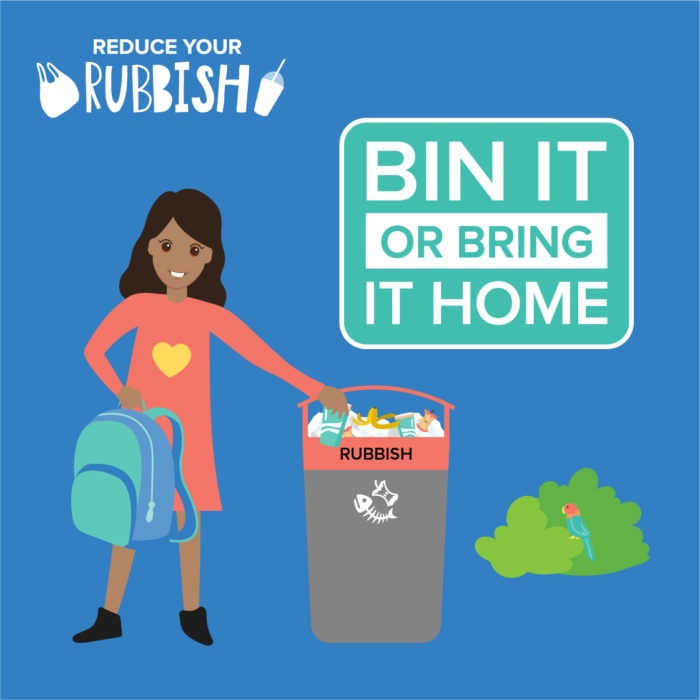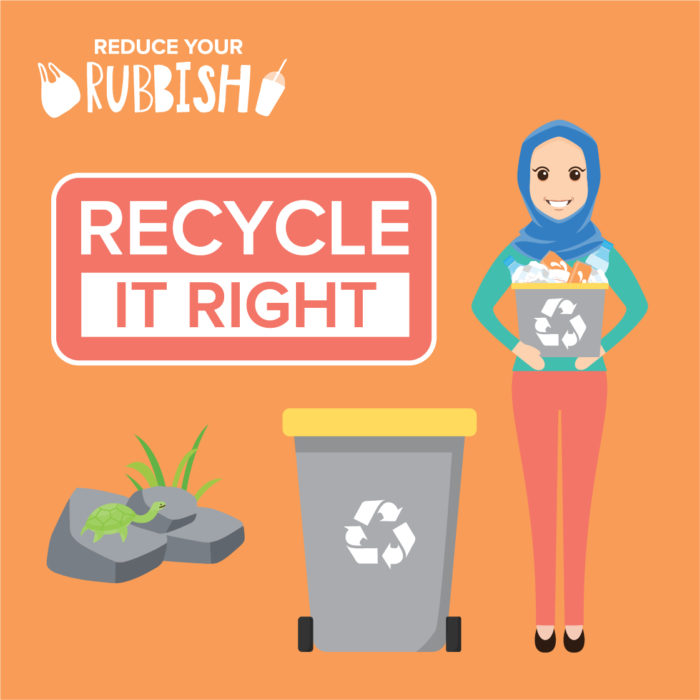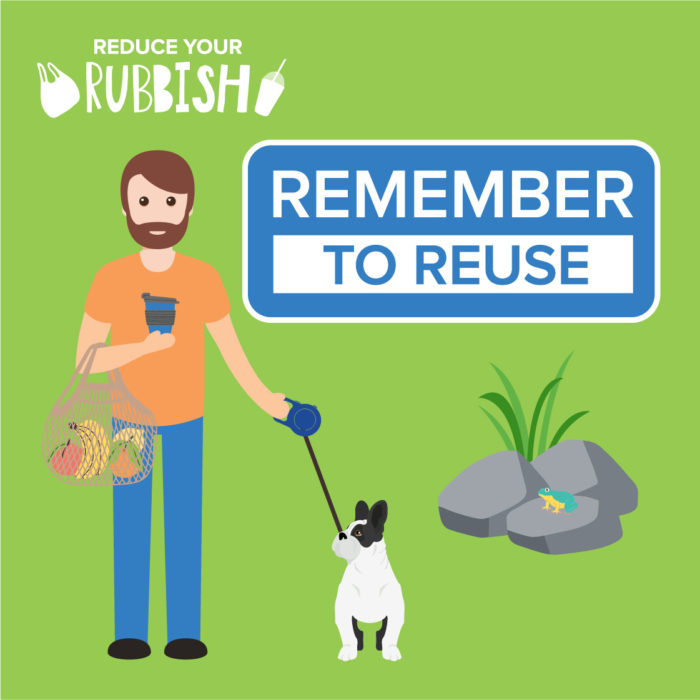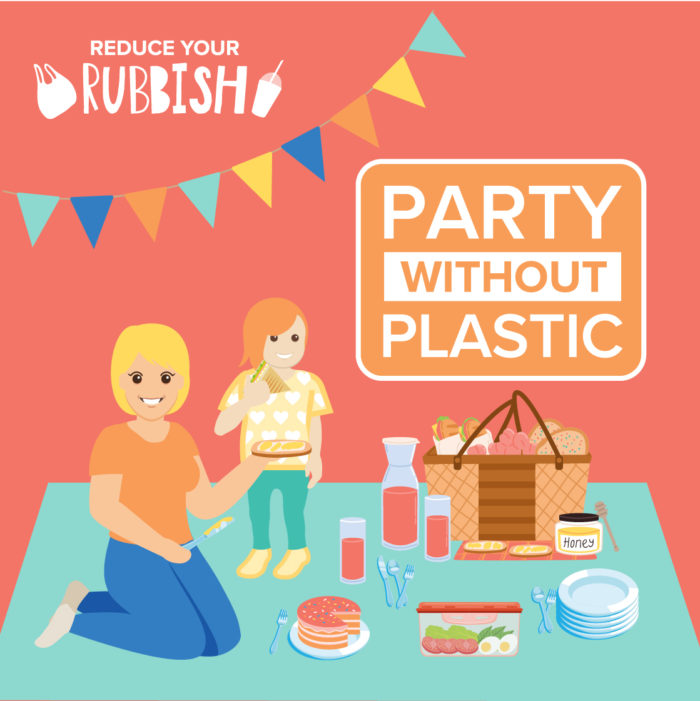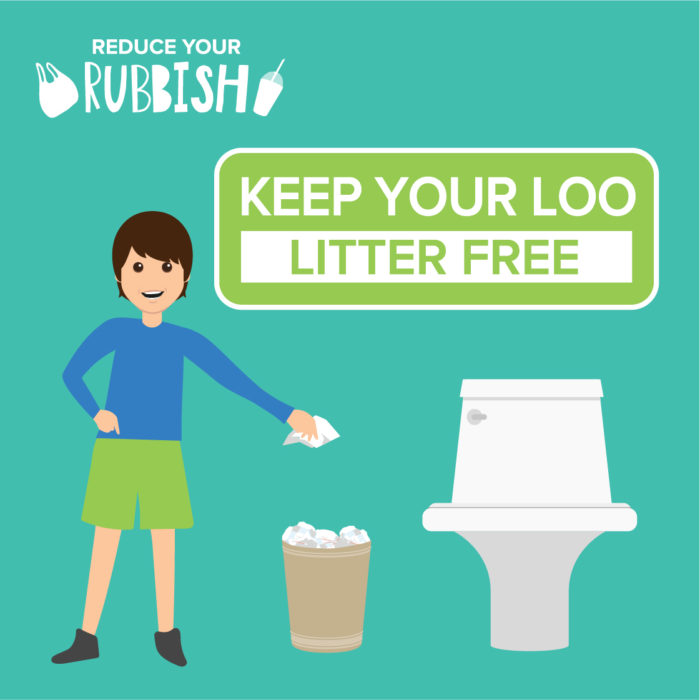Reduce Your Rubbish
Australia produces more than 78 million tonnes of waste each year! One third of it goes straight to landfill while only half is sent for recycling. Litter, especially single-use plastic, that ends up in our waterways and environment can cause a range of potentially harmful effects on humans and wildlife.
Fish, seabirds and other marine animals that feed on or become entangled in plastic debris can be injured or die from starvation or drowning. Plastics that break down in our rivers and oceans release toxic chemicals that can degrade water quality and enter the food chain.
We all have a role to play in preventing litter pollution. Whether you’re out and about, at home, in the office, or at school, there are many ways you can reduce, reuse and recycle to live more sustainably and protect our environment.
1. Bin it or bring it home
When you’re out and about, always place your litter in the bins provided or bring it home with you if none are available.
- Check your picnic or seating area before you leave to make sure nothing is left behind, particularly small items of food and litter, such as bones, bottle caps, lolly wrappers and sticks, which can be harmful to wildlife.
- If recycling bins are available, separate your litter to reduce landfill.
- Pick up your pet’s waste using bags provided or bring some with you and dispose of it correctly to prevent bacteria and other germs from being washed into our waterways.
- Keep a bag in your car to collect rubbish.
- Put your cigarette butts in a butt bin, or an ordinary litter bin when extinguished. Keep a container in your car to collect cigarette butts and never throw them out of the car window.
2. Recycle it right
Only place accepted items in your council recycling bin and learn about other ways to recycle household waste.
- Before you throw something out, think if you can reuse, repurpose or donate it.
- Look for the Australasian Recycling Label on packaging that tells you how to dispose of each element of the packaging correctly.
- Place loose recyclable items directly into the bin and not in a bag. Flatten bulky items such as carboard boxes to create more space.
- Some types of soft plastics and e-waste can be recycled but are not accepted by councils. Check out organisations like RecycleSmart and REDcycle that offer pick-up services or collection points at local supermarkets and help keep this waste out of landfill.
- Find out where your nearest Return and Earn station is located. The vending machines accept cans, bottles, cartons and juice boxes or ‘poppers’.
- Check out Planet Ark’s Recycling Near You site which has helpful information on what you can and can’t recycle in your household recycling services as well as drop-off locations to recycle a wide range of items.
3. Remember to reuse
With a little bit of planning, you can make the switch to reusable alternatives.
- Place your shopping bags, keep cup, drink bottle and other reusable items near your phone and keys so you remember to take them with you when you leave the house. Keep a couple of extra bags in the car or at work so they’re always on hand when you need to get groceries.
- Go the next step by using cotton or mesh produce bags for your fruit and veggies.
- Swap cling wrap and aluminium foil for beeswax wrap or reusable containers to store and keep food fresh.
- Find your nearest wholefoods store when you can take your own containers to buy a wide range of cooking and grocery items, and cleaning and personal care products.
- If you order takeaway food, talk to your local restaurant about providing your own reusable containers or treat yourself to a night out.
4. Party without plastic
Make your parties and other gatherings cheaper and more sustainable by swapping single-use plastic decorations and tableware for reusable items.
- Make, buy, borrow or rent reusable party and table decorations such as cloth bunting banners, tassels and lanterns.
- Check out sustainability community organisations such Boomerang Bags Parramatta and Greener Gatherings that make or loan reusable party decorations and also provide helpful hints on ways to run sustainable events.
- Avoid using single-use plastic party supplies like balloons, streamers, party poppers and straws, especially at outdoor events, as they pose a serious threat to the environment and wildlife.
- Invest in a set of colourful, unbreakable and reusable plates and cups for kids’ parties.
- Save money and plastic waste by making your own party food and storing it in reusable containers.
- Swap wrapping paper for reusable items such as decorative tea towels, scarves or fabric gift bags.
5. Keep your loo litter-free
The only things that should go down your toilet are pee, poo and toilet paper!
- Keep a bin in your bathroom (or use one that’s provided when you’re out) to dispose of wet wipes, nappies, ear buds, cotton balls, sanitary napkins and other hygiene products.
- You might think paper towels and tissues aren’t all that different from toilet paper, but they’re simply not designed to break down the way toilet paper does and shouldn’t be flushed.
- Don’t flush dental floss or large clumps of hair down the toilet as they can build up and block other waste in pipes. Also, use drain covers to protect your shower and sink drains.
- Never flush cigarette butts, medications, food or potentially hazardous household chemicals and down the toilet. Drop off unused or out-of-date medications to your local pharmacy. Locate your nearest community recycling centre to safely dispose of hazardous household chemicals.
- Don’t flush aquarium fish down the toilet. As well as causing blockages, foreign species of fish can carry and transmit diseases and destroy the habitats of other fish.
Reduce Your Rubbish is part of the broader ‘Love Your Waterways’ campaign that encourages people to take up five simple actions to reduce litter, pet waste, gardening materials, chemicals and other pollutants from entering our waterways. Find out more.


